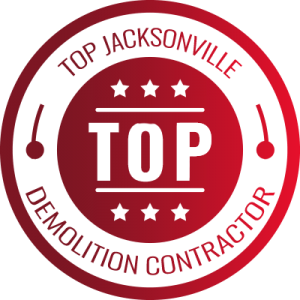



Commercial demolition in Northeast Florida comes with strict safety standards and environmental responsibilities. Any crew working on office complexes, warehouses, or dated retail centers must operate by clear rules before any material is removed. OSHA and EPA rules provide the backbone for these projects, shaping how worksites are organized, what safety steps must be followed, and what is required when handling materials that could pose health or environmental risks.
In Jacksonville, St. Augustine, and Fernandina Beach, local codes often add another layer to the federal standards. Each part of the timeline, from early planning through the final sweep, must be managed with these requirements in mind. Tackling these expectations from the start keeps commercial demolition in Northeast Florida safe, timely, and ready for the next stage of development.
What OSHA Means for Demo Sites
OSHA, short for the Occupational Safety and Health Administration, is responsible for safety on demolition sites. Any commercial property in Northeast Florida—whether it’s in a city business district or out by the airport—falls under OSHA once demolition work is active. The rules cover the safety of anyone present, whether they are laborers, equipment operators, inspectors, or site visitors.
OSHA touches almost every part of a demolition job. Fall protection is a key expectation for anyone working off the ground, whether on a scaffold or on upper floors before removal. Work zones must have clear signage, and access is managed with marked entry and exit points. On most projects, staging areas for materials, tools, and debris are roped off so that heavy equipment and foot traffic can be managed safely.
Personal protective equipment (PPE) is not just a suggestion. Everyone on the demo site wears their proper gear, which could mean a hard hat, steel-toed boots, high-visibility vests, safety glasses, gloves, or a respirator if dust or hazardous material is present. PPE is checked each morning as crews arrive. Daily briefings run through key safety topics, which will change if the job brings new site risks, like weather shifts or new machinery moving in.
At many Jacksonville demo sites, for example, OSHA compliance means keeping thorough daily checklists and documenting all safety meetings. It also means training everyone on-site so they know how to handle noise, debris, or unexpected equipment operations. General contractors, subcontractors, and property owners all share some responsibility for upholding OSHA at each stage.
How EPA Rules Affect Commercial Demolition Work
The EPA has a different focus when it comes to commercial demolition in Northeast Florida. Their responsibility centers on materials that can hurt people or the environment. Lead paint, asbestos insulation, fluorescent light ballasts with PCBs, or chemicals in tanks and old pipes are top concerns.
Buildings put up or remodeled before modern codes are especially likely to have regulated materials. Any time demolition is planned, an environmental assessment is advised to test for hazards before equipment arrives. If hazardous materials are found, crews follow EPA protocol for removal, tracking, and final disposal. This isn’t just about bagging up debris—it means using sealed bags, labeling waste, and maintaining records from the site to the landfill.
In Northeast Florida, cities and counties may ask for extra confirmation that hazardous materials are being sorted and removed by the book. For properties near beaches, rivers, or stormwater systems, proof is needed that contaminated debris won’t leave the site and pollute water sources. Local requirements can also include reporting to city departments when each type of material is checked out or hauled away.
Paperwork piles up here, too. EPA-related steps include signing off on asbestos surveys, keeping manifests for hazardous waste, and making sure anyone who transports material is qualified for the job. Some projects—even after environmental risks are ruled out—need signoff from both city and county before the next step in demolition can begin.
Coordinating with Local Regulations in Northeast Florida
Federal safety and environmental rules are the starting point, but local agencies in Jacksonville, St. Augustine, and surrounding counties add requirements that apply to site logistics, timing, and more. Early talks with city and county planning offices can make the difference between a project that sails through or one that gets stuck at inspection.
Duval County occasionally requires specialized permits if demolition happens close to a main road or public area. Extra paperwork may cover temporary traffic routing, sidewalk protection, or late-evening work hours. In areas such as Clay County, projects on historic land or those flagged for heritage review can face added steps before demolition gets the go-ahead.
Other local challenges come from site conditions. Properties near the St. Johns River might fall into a mapped flood zone, which triggers water management rules and erosion controls, especially in Florida’s rainy season. Some cities require silt fences, retention barriers, or special stormwater plans before a demolition permit is issued.
All of these steps layer on top of OSHA and EPA obligations. Contractors and owners often coordinate between agencies and track all permits and site logs, including daily notices, so that city or county inspectors have everything available on request. Careful coordination helps keep projects from losing days over missing paperwork or last-minute regulatory surprises.
Planning Ahead to Avoid Delays or Penalties
One of the smartest moves for smooth commercial demolition in Northeast Florida is working ahead of problems instead of reacting to them. That means setting up each step before it is needed so there is no scrambling at the last minute.
Here are a few ways to keep your project on schedule and in compliance:
– Confirm that your demolition contractor is licensed for commercial work and understands both OSHA and EPA obligations.
– Schedule all utility disconnects as soon as you know your timeline. This means power, water, gas, and even communications lines. Delays with these can stop your project before it starts.
– Gather every record you can on prior renovations, changes to building use, and existing site plans. Knowing about items like concealed heating oil tanks, unmarked pipes, or previous fire damage can save time and keep workers safer.
– Double-check that all local, state, and federal permits are in hand and that inspections are scheduled as required.
– Keep safety and environmental paperwork ready to show to any inspector, including daily OSHA logs, environmental surveys, and waste removal manifests.
Missing even one of these can mean having a crew on standby while problems get sorted out—or facing fines or work stoppages that hurt your bottom line.
A Safer Way to Work in Northeast Florida
OSHA and EPA rules deserve respect on every commercial demolition site. They are not there just for paperwork. These rules create cleaner, safer jobs and make property turnover smoother for everyone.
When commercial demolition in Northeast Florida sticks to all required rules, it’s easier to keep a project moving, and city inspectors are more efficient at signoffs and walk-throughs. Many commercial clients in the region request site plans that outline specific OSHA and EPA checkpoints to share with local inspectors and stakeholders before demolition begins.
By knowing what OSHA, EPA, and your local agencies expect from the start, you build confidence and prevent last-minute confusion. Taking these rules seriously paves the way for demolition jobs that protect workers, safeguard the environment, and leave your project ready for what’s next.
Planning a demo job on commercial property in Jacksonville means staying on top of every safety rule and building code. From permits and utility shutdowns to asbestos checks, we’ve got the details covered so your timeline doesn’t slip. We’ve handled offices, industrial sites, malls, and healthcare spaces all across the region. To see how we approach commercial demolition in Northeast Florida, contact Elev8 Demolition.

